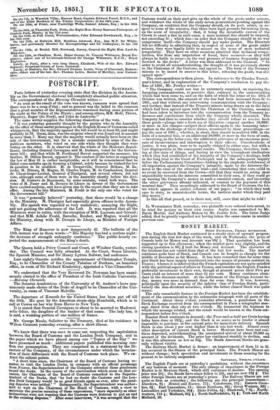We knew that there was more to come out respecting
the capitulation between the Board of Customs and the London Dock Company, and in the paper which we have placed among our " Topics of the Day " we have presumed as much : additional papers published this morning con- -firm our presumption. They are comprised in a statement by the Di- rectors of the Company, of the circumstances under which the termina- tion of their differences with the Board of Customs took place. We ex- tract the salient points. "A short time since, the Chairman of the Board of Customs having °c- ession to visit the London Docks, in company with an official personage from France, the Superintendent of the Company attended these gentlemen round the docks. In the course of the conversation which arose on that oc- casion, the Chairman of the Board of Customs remarked to the Superin- tendent of the Docks, that he had no doubt the Customs and the Lon- don Dock Company would be as good friends again as ever, after the pend- ing disputes were settled.' " Subsequently, the Superintendent was author- ized to wait on the Chairman of the Board of Customs, with a view to ascertain the precise meaning of these expressions, "more especially as other intimations were not wanting that the Customs were desirous to put an end to the existing disputes." After some interviews, "it was arranged that the Customs would on their part give up the whole of the goods under seizure, and withdraw the whole of the sixty-seven prosecutions pending against the Company, on condition that the Company should, on its part, admit, in re- spect to some of the seizures, that there were legal grounds for making them, on the score of irregularity ; that, it being the invariable custom of the Crown to exact a fine in such cases, a mere nominal fine should be imposed, not exceeding 51. ; which fine—in order that the Company should in no way compromise itself—the Company should pay under protest. The Directors felt no difficulty in admitting that, in respect of some of the goods under seizure, they were legally liable to seizure on the score of mere technical irregularity.' They have on other occasions admitted that technical irregu- larities free from any imputation of fraud, have occurred—as they will always be liable to occur—in the vast pressure of business frequently going forward in the docks." A letter was then addressed to the Customs. " In order to avoid all misunderstanding, the draught of it was previously shown to the Chairman of the Customs, and agreed to. The form of the Treasury minute to be issued in answer to this letter, releasing the goods, was also agreed upon."
The correspondence is then given. In reference to Sir Charles Travel- yan's letter, and in explanation of the Company's resolution to pay the fine of 1001., Mr. Powles writes-
" The Company. could not but be extremely surprised, on receiving the foregoing communication, to perceive that, contrary to the understanding which had been come to, and on the faith of which the letter of the 29th of October was written, the amount of the fine had been increased from 51. to 1001., and that without any intervening communication with the Company.; and further, that instead of the Treasury minute being drawn up in the form, which had been agreed upon with the Chairman of the Customs, occasion had been taken to introduce into the communication from the Treasury in- ferences and conclusions from which the Company wholly dissented. The Company had then to consider whether they should refuse to receive back these goods—plunge into a fresh sea of litigation—expend another 10,0001. or more in law charges—subject their officers again to the harassing inter- ruption in the discharge of their duties, occasioned by these proceedings—or pay the sum of 100/. ; whether, in short, they should be mulcted 1001. in the form of a nominal fine, or an additional 10,0001. or more in the form of costa, —involving, in the latter case, the additional grievance of an enormous pres- sure of inconvenience and interruption to their officers. Considerations of justice, it was plain, were to be equally violated iu either case, but with a vast disproportion in the consequent results. The Company, therefore, look- ing at this state of things, and having in view the triumphant vindication which they had established of the integrity of the Company's dealings, both in the long trial in the Court of Exchequer and in the subsequent inquiry before the Parliamentary Committee—looking to the emphatic withdrawal of all imputation against the Company's integrity, made by the Attorney-Ge- neral at the close of the aforesaid trial—and considering that costs could in no event be recovered from the Crown—felt that they would be acting most unjustifiably towards the interests committed to their care, if they could go on wasting the Company's money in such a onesided contest, and incurring the other grievances already indicated, or consent to the payment of this nominal fine." They accordingly addressed to the Board of Customs the let- ter which appears in earlier columns of our paper ; "in which they took care to state, in unmistakeable terms, the motives under which they paid this money."
Is this all that passed, or is there not, still, more that might be told ?


























 Previous page
Previous page